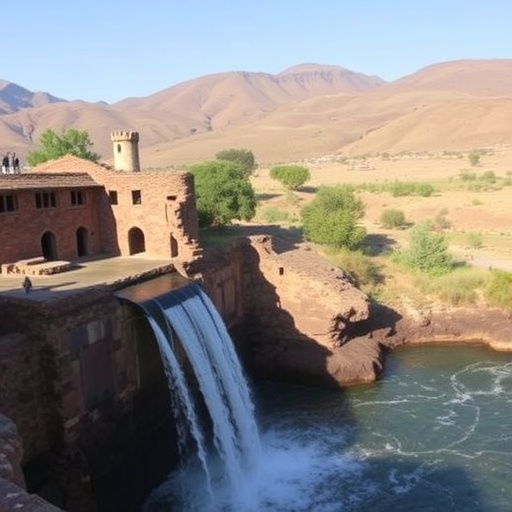In recent years, water scarcity has emerged as a pressing challenge affecting multiple sectors across the globe, particularly in regions like South Africa. This intricate dilemma profoundly impacts higher education institutions, which must navigate the complexities of maintaining sustainable learning environments amidst dwindling water resources. The research conducted by Nkumbesi, Chigbu, and Makapela sheds light on the critical intersection of water scarcity and education, emphasizing the need for innovative solutions and collaborative efforts among various stakeholders.
As South Africa grapples with serious hydrological challenges, the implications for higher education institutions are significant. Campuses, traditionally seen as sanctuaries of knowledge, now find themselves on the frontline of a crisis that threatens not only operational integrity but also the academic pursuits of students and faculty alike. The research illustrates that water scarcity affects different facets of university life, from basic hygiene facilities and classroom environments to research capabilities and the overall welfare of the student body.
Fueling the urgency for proactive measures, the findings reveal that water scarcity leads to increased operational costs. Universities are forced to invest significantly in alternative water sources and technologies that can mitigate the impact of shortages. This financial burden often diverts funds away from educational programs and infrastructural improvements, creating a cycle of compromise in the quality of education offered.
The researchers argue that addressing water scarcity is not merely an operational challenge but a pivotal aspect of fostering sustainable learning. As universities adapt to climate fluctuations and resource scarcity, they must integrate sustainability into their curricula. The introduction of water management courses and eco-friendly practices can empower students to become informed citizens who advocate for responsible resource usage in their communities and future workplaces.
Moreover, the study emphasizes the value of collaboration among stakeholders, including government agencies, community organizations, and the private sector. By uniting efforts, various entities can pool resources, share knowledge, and devise robust strategies for tackling water scarcity issues effectively. Initiatives could include public-awareness campaigns on water conservation and partnerships aimed at developing innovative wastewater recycling technologies.
Another critical aspect highlighted in the study is the necessity for research in water management strategies tailored specifically for South Africa’s unique climatic and socio-economic landscape. Greater investment in academic research can yield homegrown solutions that resonate with local realities, equipping students and institutions with the tools needed to thrive in a water-scarce environment.
The implications of this research extend beyond the borders of South Africa, offering valuable insights for other regions facing similar challenges. As global water scarcity worsens due to climate change and unsustainable consumption patterns, higher education institutions worldwide may benefit from adopting the strategies proposed by Nkumbesi, Chigbu, and Makapela, thereby embedding sustainability in their core missions.
While the study provides a pathway forward, it also reflects the urgency for immediate action. The timeline for addressing these challenges is short, compelling institutions to recognize that integrating sustainability into their operations and curricula is essential for their survival and relevance.
The shift toward a more sustainable approach will require commitment and perseverance from all levels of the academic community. Faculty members must be at the forefront, leading by example and contributing to a culture that values innovation and responsible stewardship of resources. This collective effort can empower future leaders to champion water conservation measures that extend far beyond campus boundaries.
In conclusion, water scarcity presents a formidable challenge but also an opportunity for higher education institutions to redefine their roles in society. By fostering a culture of sustainability, universities can not only adapt to environmental pressures but also cultivate a generation of students equipped to drive meaningful change. The research by Nkumbesi, Chigbu, and Makapela serves as a clarion call for action, urging stakeholders to unite in the pursuit of sustainable solutions that ensure equitable access to water and, ultimately, a thriving educational environment.
The study encapsulates a critical narrative that goes beyond the confines of canonized academic discussions. It highlights the interplay between resources and learning, advocating for a holistic approach to academia where sustainability is not just an adjunct but a foundational tenet. As the crisis deepens, institutions that prioritize water management will not only endure but flourish, setting a precedent for educational resilience in a changing world.
Sustainable practices, once perceived as supplementary, are quickly becoming non-negotiable in the quest for academic excellence within water-scarce regions. This transformative journey toward sustainability in higher education is an evolving narrative that necessitates continuous engagement, innovative thinking, and a steadfast commitment to resource stewardship. The future of education—and indeed society—may very well depend on it.
Subject of Research: Water scarcity and sustainable learning in South African higher education.
Article Title: Water scarcity and sustainable learning in South African higher education: challenges, solutions, and stakeholder insights.
Article References: Nkumbesi, A.A., Chigbu, B.I. & Makapela, S. Water scarcity and sustainable learning in South African higher education: challenges, solutions, and stakeholder insights. Discov Educ 4, 499 (2025). https://doi.org/10.1007/s44217-025-00786-y
Image Credits: AI Generated
DOI: https://doi.org/10.1007/s44217-025-00786-y
Keywords: Water scarcity, sustainable learning, South African higher education, educational resilience, stakeholder collaboration, innovative strategies.




